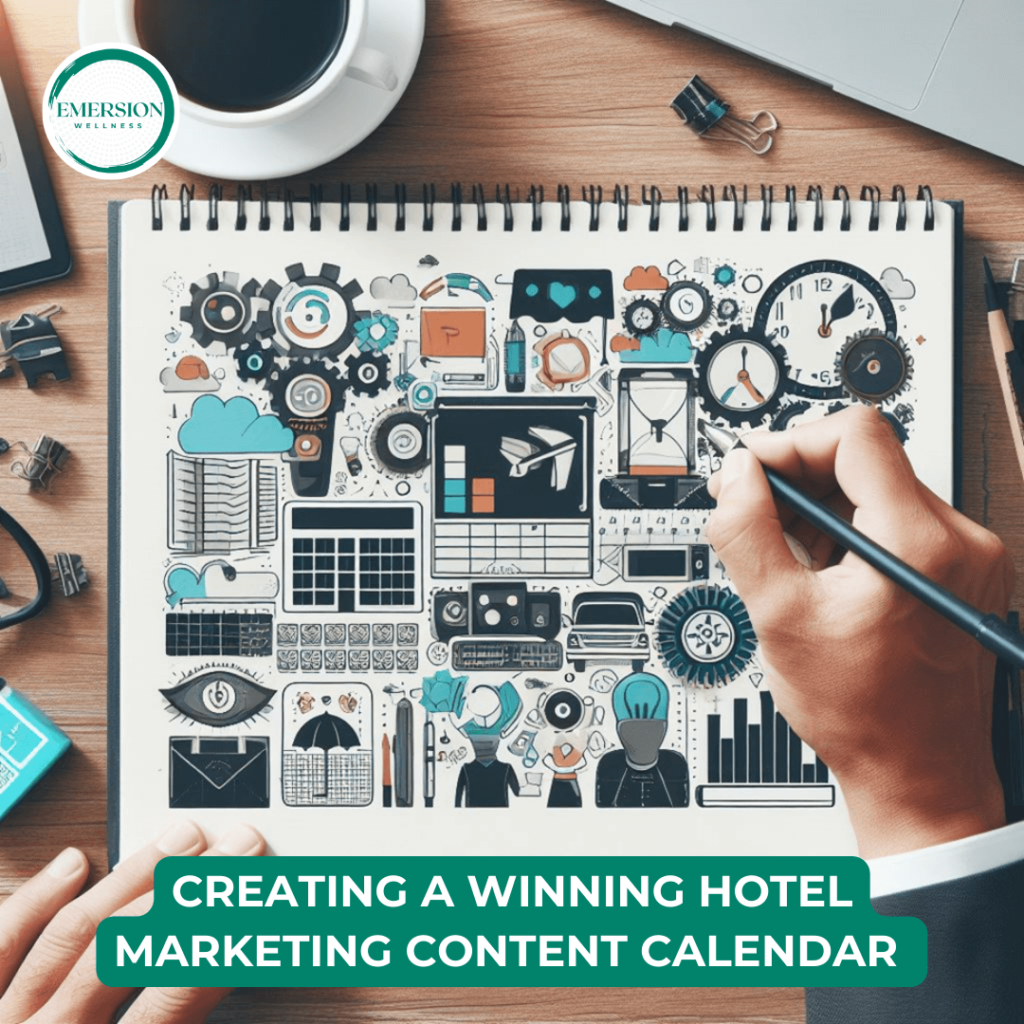In today's crowded hospitality marketplace, consistent, high-value content is essential for hotel marketing success. But crafting a steady drumbeat of campaigns and assets can be challenging without a plan. That's where a content calendar comes in. At its core, a hotel marketing content calendar is a roadmap for creating, publishing, and promoting content across media on an ongoing basis. When optimized effectively, it can become the backbone of your digital marketing strategy. In this comprehensive guide, we’ll explore how to build a winning hotel content calendar with the framework, formats and planning to attract more guests all year long.
Table of Contents
Key Takeaways for Hotel Marketing Content Calendar
- Profile target audiences and their media habits
- Set specific goals and define success metrics
- Audit existing assets to reveal gaps and opportunities
- Plot major seasonal campaigns and promotions
- Maintain consistent publishing of recurring content
- Brainstorm diverse topics and angles relevant to guests
- Assign creation dates and owners across teams
- Integrate robust promotion plans for each asset
- Continuously analyze and optimize based on performance
Why Hotels Need a Hotel Marketing Content Calendar?
With travelers overwhelmed by choices, a cohesive content plan is vital to cutting through the noise. A calendar keeps your messaging consistent, focused and strategic. Benefits include:
- Outlines content types aligned to business goals
- Maintains regular publication cadence
- Maximizes impact of promotions and campaigns
- Tracks progress and performance benchmarks
- Surfaces content gaps and new opportunities
- Helps create in advance versus last-minute scrambling
- Allows collaboration across teams and contributors
In short, a calendar brings order and intentionality to content creation. Follow these best practices as your guide.
Crafting an Effective Hotel Marketing Content Calendar
An effective hotel marketing calendar reflects your audiences, goals and unique value. It should provide an editorial-like overview of planned content across formats and channels over a set timeframe. Build yours step-by-step following this approach:
Define Target Audiences
Get clear on who you want to reach - leisure guests, business travelers, event/wedding bookers, etc. Outline their demographics, interests and media habits. Also factor in lifecycle stage - new leads vs repeat guests.
Identify Goals and KPIs
What does your content aim to achieve? Set specific goals like bookings, revenue, database growth, engagement rate. Define the KPIs that indicate progress against goals. Track KPIs for continuous optimization.
Audit Existing Assets
Review all current owned media - website pages, blogs, social accounts, ads, emails, etc. Assess performance to date. This identifies content strengths and gaps to build on going forward.
Map Out Key Campaigns and Promotions
Plot major seasonal offers, packages and initiatives in your calendar. Consider annual events, holidays, awareness months relevant to local area or audience. Identify partnership and sponsorship opportunities to integrate.
Schedule Out Recurring Content Types
Determine consistent content like monthly newsletters, weekly blog posts, daily social media updates. Factor in production timelines for each. Maintain regularity to nurture audience relationships.
Identify Topics and Angles
Brainstorm specific topics that align to products, offers and audience interests. Take both evergreen and timely angles. Outline angles per quarter or month, allowing flexibility to add emerging ideas.

Assign Creation Dates and Owners
Plug in target creation dates for all content types and assign owners across teams. Ensure thorough briefs are provided to creators. Identify dates for reviews and approvals before publishing.
Map Out Promotion Strategy
Outline planned promotion of each asset via website, email, social media, PR outreach, ads. Promotion is as crucial as creation, so integrate both in planning.
Analyze Performance and Optimize
Track content performance continuously - views, engagement, conversions. Identify high-performing and lagging areas. Shift strategies based on data insights for maximum impact.
Conclusion
An optimized Hotel Marketing Content Calendar is crucial for hotels to effectively attract and engage guests in our digital-first traveler landscape. It provides the vision, coordination and measurement needed to ensure your marketing content resonates year-round. An effective hotel marketing calendar acts as both creative guide and performance tracker. For hands-on help building yours, contact Emersion Wellness. Our team brings deep expertise in crafting results-driven hotel content marketing strategies.
Ready to put a data-driven system in place? Contact Emersion Wellness to discuss how we help hospitality businesses craft content that delivers true ROI. Our team will guide you in developing an audience-focused calendar designed to drive consistent growth and bookings.
FAQs About Hotel Content Calendars
-
How can hotels determine the right mix of content formats?
Analyze competitor content as well as historical performance data on your own blogs, social posts, videos, emails, etc. Identify your highest converting formats and build those into the calendar strategically.
-
What's the best way to create an editorial calendar for social media?
Audit your existing social content and engagement by platform. Plan daily posts accounting for image/video mix and target different audiences with each network's unique value proposition.
-
How should hotels structure weekly newsletters or emails?
Include sections like property news, local area spotlight, special offers, seasonal events, guest features and previews of upcoming on-site activities. Vary content weekly while maintaining familiar segments.
-
How can hotels get premium content from influencers?
Identify relevant voices in your location or audience niche. Pitch partnerships 3-6 months out offering exposure, free stays, experiences and other perks in exchange for co-created content.
-
Should press releases be integrated into the calendar?
Yes, outline target press release topics and timing such as new packages/promotions, upcoming on-site events, or relevant seasonal story angles to pitch to media.
-
How do hotels make the most of awareness months and holidays?
Plot relevant occasions on your calendar and plan social, email, ad and PR campaigns to capitalize in the weeks leading up to each major date.
-
Should calendars outline paid advertising plans?
Definitely - build out target audiences, messaging, creative needs and publication dates for all digital and print ad campaigns across owned channels.
-
What’s the best resource for exploring content angle ideas?
Tools like Buzzsumo and Google Trends provide insight into which topics within your niche are resonating at any given time. Stay on pulse.
-
How can hotels use hashtags effectively in content planning?
Research relevant trending hashtags to integrate into social updates, stories, captions etc where they fit naturally. This expands discoverability.
-
How should evergreen versus timely content be balanced?
Include 60-70% evergreen content focused on your hotel's core differentiators, location and amenities. Leave 30-40% flexibility for capitalizing on timely trends.
Contact Us For More Details

I'm Nathan Baws, a nutrition nerd, exercise and weight loss expert, and an unwavering advocate for good health. As the founder of Emersion Wellness, I'm passionate about crafting Seamless Weight Loss Programs to supercharge hotel revenue and transform lives. We've pioneered the World's First Plug & Play Weight Loss Programs for top hotels and resorts, sparking a wellness revolution. Beyond my professional journey, you'll often find me hiking, swimming, and riding the waves, embracing every moment in nature. Join me on this exhilarating journey towards diet, health and wellness.

